Edition: 3 to 14 June 2024
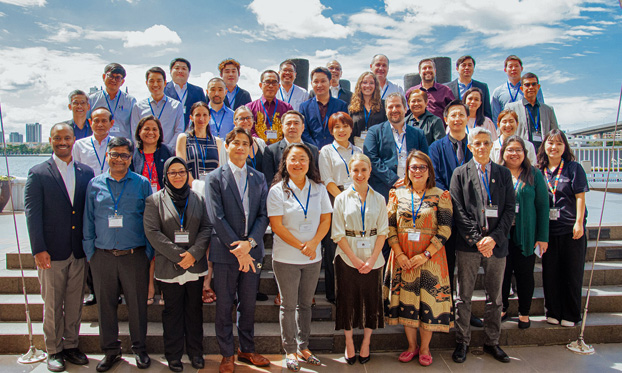 ©FAO/Domingo Caro III | ASIA AND THE PACIFIC Launch meeting of the African swine fever partnership platform
FAO, in collaboration with the Trust in Animals and Food Safety Forum, organized the launch meeting for the African swine fever (ASF) partnership platform in Bangkok between 12 and 13 June. The platform facilitates the sharing of experiences and practical solutions between stakeholders and serves as a source of reliable information for the public. The event introduced and gathered feedback on the ASF partnership platform and facilitated technical insights sharing between government and private sectors on ASF management since its 2018 impact on Asia. FAO extends sincere appreciation to the Defense Threat Reduction Agency (DTRA) and the Ministry of Agriculture, Food, and Rural Affairs of the Republic of Korea (MAFRA) for their financial support. |
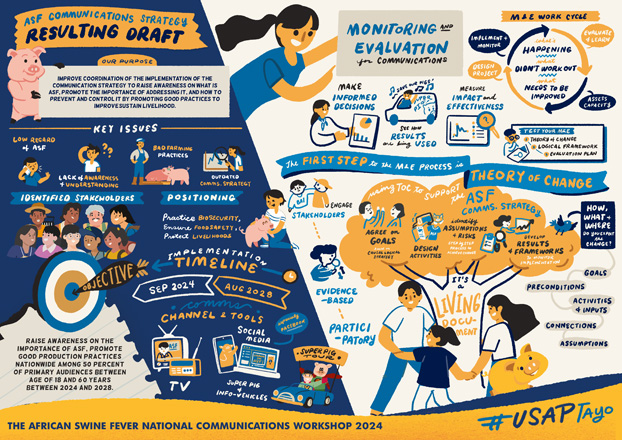 ©FAO | ASIA AND THE PACIFIC AND THE PHILIPPINES Providing technical support in drafting communication strategy FAO RAP provided technical support to the Philippine government early this June to refine their communication strategy. The activity, funded by the Ministry of Agriculture, Food, and Rural Affairs of the Republic of Korea (MAFRA), is the culmination of several backstopping missions in the past few months as part of the support to the Philippines after the government’s request for assistance in revising its ASF communication strategy. Key outputs from the workshop include the agreement on next steps in the completion of the ASF communication strategy and agreed outline of the strategy. |
Learn more about our work on ASF here.
| |
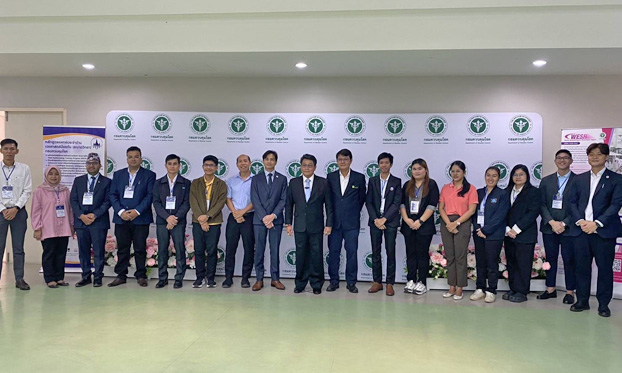 ©FAO/R-FETPV, DLD | ASIA AND THE PACIFIC First module of regional field epidemiology training program for veterinarian launched With financial support from the United States of America Defense Threat Reduction Agency (DTRA) and the United States Agency for International Development (USAID), the first module of the Regional Field Epidemiology Training Program for Veterinarians (R-FETPV) is set to be delivered between 6 June and 20 July in Bangkok, with 12 new trainees. This training module is designed not only to provide knowledge on epidemiology concepts but also to provide experience to trainees on how to analyze existing animal health and disease-related data, and information from surveys and surveillance systems. The orientation meeting for the training was held on 7 June where FAO ECTAD Regional Manager Kachen Wongsathapornchai delivered opening remarks and words of encouragement to the new batch of participants. |
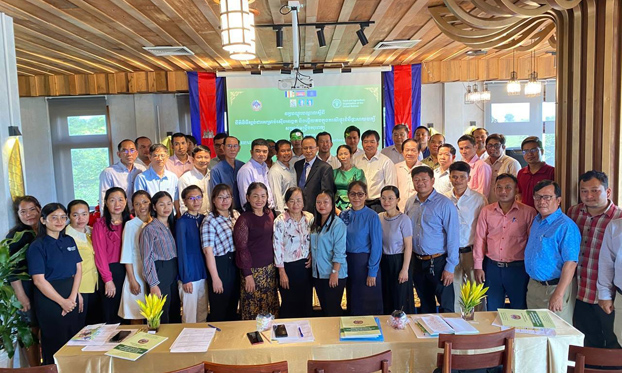 ©FAO/Sokhim OL | CAMBODIA Highly pathogenic avian influenza standard operating procedure training for field officers FAO, in collaboration with the General Directorate of Animal Health and Production (GDAHP), conducted highly pathogenic avian influenza standard operating procedure training for 43 field officers from 12 to 13 June in Mondulkiri province. The training focused on early detection, effective outbreak investigations and response to avian influenza outbreaks. With the United States Agency for International Development (USAID) financial support, more training will be held in four provinces, reaching approximately 200 field veterinary officers responsible for avian influenza outbreak investigations and response.
|
Learn more about our work on capacity development here.
| |
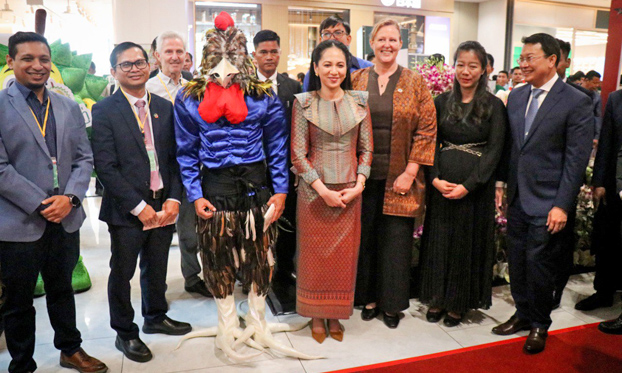 ©FAO/Pisey Khun | CAMBODIA Exhibition and discussion forum on the taste of Khmer agricultural products
In early June, the Ministry of Agriculture, Forestry and Fisheries, with the esteemed patronage of Cambodia’s First Lady, Lok Chumteav Dr Pich Chanmony, and partners including FAO and USAID, launched the Khmer villages exhibition and discussion forum on the taste of Khmer agricultural products. This event aimed to support local agriculture and provide a platform for collaboration among stakeholders in the food and beverage and hospitality sectors. FAO’s One Health and livestock production mascot, Super Chicken, drew attention, raising awareness of avian influenza control and prevention among government officials and the public. Read more here. |
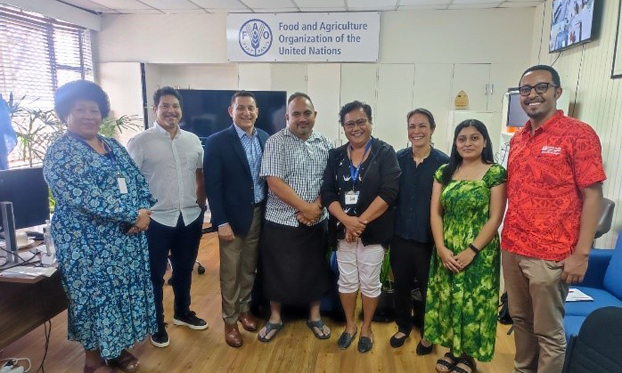 ©FAO/Ashitesh Prasad | FIJI AND ASIA AND THE PACIFIC Coordinating animal health activities in the Pacific Following the launch of the USAID Global Health Security (GHS) project in Fiji earlier this year, FAO RAP travelled to Fiji to support the team in consulting with stakeholders and developing the next year’s work plan. With many partners working in the Pacific, FAO is ensuring the coordination of efforts and met with USAID, World Health Organization (WHO) and The Pacific Community to discuss the GHS project activities in Fiji. FAO also met with Fijian government stakeholders to better understand how the project can support strengthening Fiji’s animal health system. |
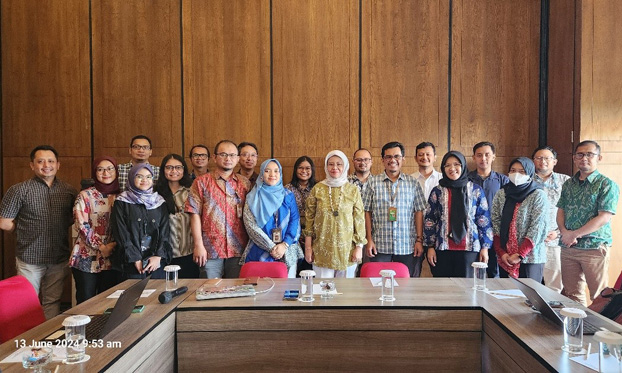 ©FAO/Andri Jatikusumah | INDONESIA Coordination meeting on national zoonosis and emerging infectious disease information system From 13 to 14 June, FAO and the Coordinating Ministry of Human Development and Cultural Affairs (CMHDCA) held a coordination meeting in Bogor to discuss the activation of the National Zoonosis and Emerging Infectious Diseases Information System (SIZE) at the subnational level. Supported by USAID, participants included representatives from various ministries. The meeting focused on reviewing SIZE activation progress, developed a work plan, and evaluated SIZE operations. Participants agreed on a timeline for developing a module, conducting refresher training, implementing training at provincial levels, activating SIZE in specific regions, and conducting pilot district training along with discussing the systems monitoring and evaluation. |
 ©FAO/Saskia Soedarjo | INDONESIA Coordination meeting with the Coordinating Ministry of Human Development and Cultural Affairs
On 7 June, FAO and CMHDCA, with USAID support, held a coordination meeting to align project activities and establish a collaborative framework for the GHS project 2023-2027. This meeting facilitated the smooth initiation of the 2023-2027 project and ensured compliance with CMHDCA’s protocols. Participants agreed on the monitoring and evaluation framework, operational framework for project administration, operations and resource mobilization. Additionally, they agreed on the work plan for 2024 and provided initial information on the work plan for 2025. . |
Learn more about our work on partnerships here. | |
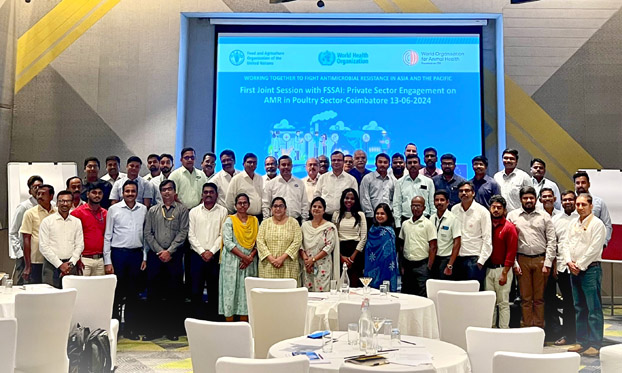 ©FAO/Oo Khin | ASIA AND THE PACIFIC AND INDIA The first private sector engagement in combating antimicrobial resistance
FAO, in collaboration with the Food Safety and Standards Authority of India and the National Food Laboratory in Chennai, conducted the first of three sessions event titled “Working together to fight antimicrobial resistance (AMR) in Asia and the Pacific” on 13 June in Coimbatore. Funded by the European Union (EU), the session was organized under the EU Tripartite AMR project, and aimed to increase private sector engagement in combating AMR. Over 50 participants, including poultry producers, integrators, processors, feed manufacturers, chick suppliers, fast food retailers, poultry farmers and poultry antibiotics and medicine manufacturers attended the workshop. |
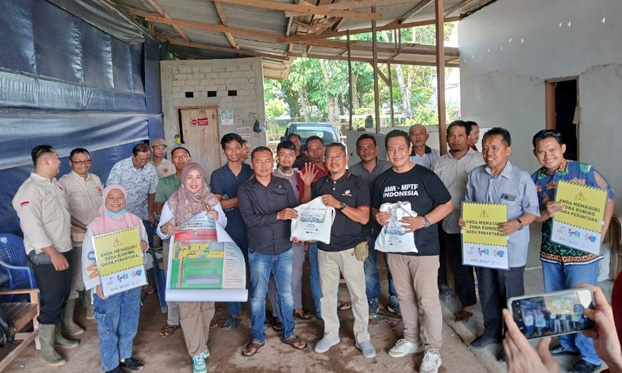 ©FAO/Marina Sitepu | INDONESIA Monitoring and evaluation of Field Farmers School in East Lampung
From 5 to 7 June, FAO and the Indonesian Ministry of Agriculture (MoA), with funding from FAO HQ, conducted monitoring and evaluation activities in Lampung to assess the progress and challenges of the RENOFARM (reduce the need for antimicrobials in agrifood systems) programme through Field Farmers School. They evaluated its implementation, assessed infection and control practices using a poultry biosecurity plan checklist, distributed biosecurity signs and tools and guided farmers in effective infection and control practices. Monitoring pilot farms followed baseline data collection from 50 poultry farms in East Lampung in January. Farmers shared feedback in focus group discussions. MoA and FAO observed project impacts and challenges and participants completed biosecurity checklists. |
Learn more about our work on AMR here.
| |
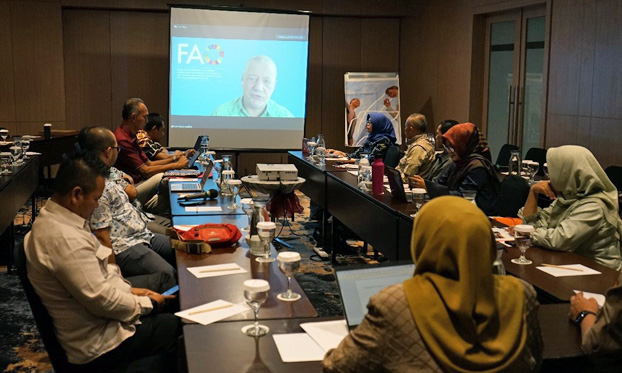 ©FAO/Alia Dwirahmani | INDONESIA Formation of West Java TIKORDA discussed FAO and CMHDCA held a meeting with West Java Provincial Government, cross ministries and stakeholders to discuss details regarding the formation and operationalization of West Java TIKORDA (subnational coordination team) to enhance zoonoses and emerging infectious diseases prevention and control efforts. This occasion was supported by USAID and was a follow-up from the previous meeting on signing of the commitment pledge by representatives from West Java province, West Bandung district and Sukabumi district. |
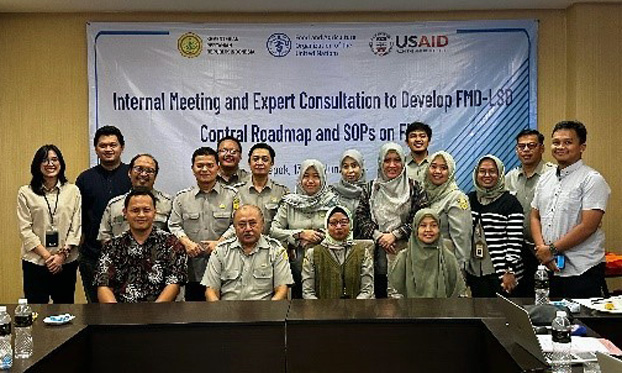 ©FAO/Wahid Husein | INDONESIA Expert consultation on developing foot-and-mouth disease and lumpy skin disease control roadmap From 13 to 14 June, FAO and MoA held a consultation meeting to develop a foot-and-mouth disease (FMD) vaccine disposal standard operating procedure and a national lumpy skin disease (LSD) control roadmap. With funding from the Australian Government, the participants discussed FMD vaccine disposal standard operating procedure using COVID-19 and polio vaccine disposal materials from MoA and WHO as references. The team and MoA experts drafted the proposals, planning to finalize them in the coming months. |
Learn more about our work on epidemiology here.
| |
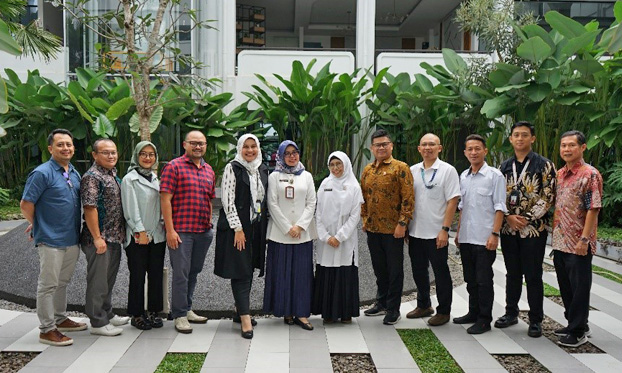 ©FAO/Alia Dwirahmani | INDONESIA Zoonoses awareness programme for school students in West Java On 12 June, FAO, CMHDCA and MoA visited the West Java regional secretary office to discuss the expansion of the zoonoses awareness programme in primary and secondary education, supported by USAID. The meeting agreed that FAO and MoA would collaborate with the government in West Java to create a zoonoses awareness module for the school health unit programme, supporting the healthy schools campaign. |
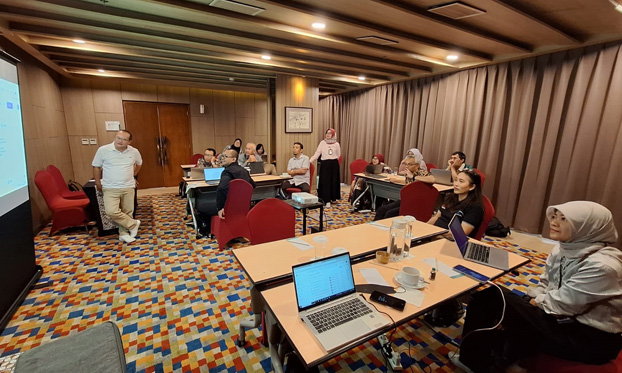 ©FAO/Ratmoko Saputro | INDONESIA Zoonoses awareness programmes in schools and universities
Zoonoses awareness programmes in schools and universities In early June, FAO and MoA hosted a meeting to develop guidance for a zoonoses awareness programme in collaboration with the Gadjah Mada University. Additionally, a training of trainer session for ten civil servants of Transformational Teacher Group was conducted for the zoonoses awareness programme in primary school in Yogyakarta, with support from USAID. |
Learn more about our work on risk reduction along the value chain here.
| |
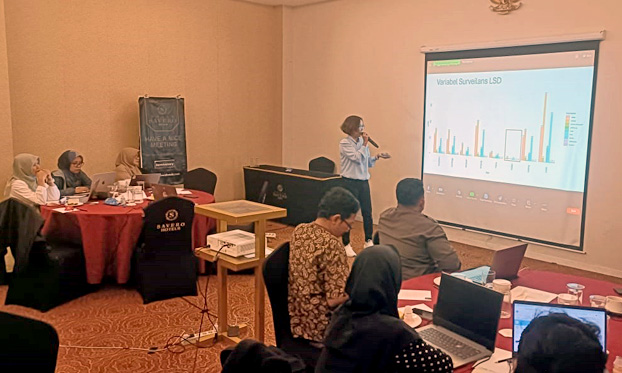 ©FAO/Ludovika Jessica | INDONESIA Developing technical guidelines for lumpy skin disease virus surveillance FAO and MoA, with support from the Australian Government, hosted a meeting to develop technical guidelines for lumpy skin disease virus surveillance from 11 to 13 June. The MoA Director of Animal Health at MoA opened the event, emphasizing the importance of surveillance for LSD. Presentations covered the current situation, surveillance activities, and diagnostics. International experts from FAO and International Atomic Energy Agency discussed global LSD surveillance, diagnosis techniques and the need for continuous monitoring and vaccine quality analysis. Participants drafted technical guidelines for LSD surveillance, ahead of outbreak investigations in affected districts conducted by disease investigation center in Wates.
|
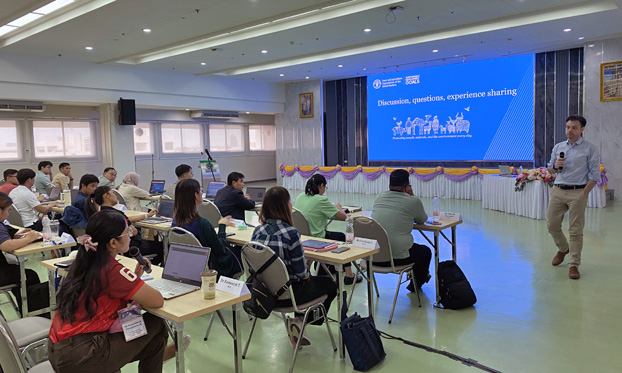 ©DLD R-FETPV | ASIA AND THE PACIFIC Animal health surveillance and application at the global level FAO delivered a presentation on “Animal Health surveillance and application at the Global level” to the trainees participating in the field epidemiology training (FETP) and Regional field epidemiology training for veterinarians (R-FETPV) as part of the basic epidemiology and surveillance data analysis module. The event, conducted with the financial support from DTRA and USAID, was a great opportunity to share the perspective of animal health surveillance and engage experts across the sector in discussion.
|
| Learn more about our work on surveillance here. | |
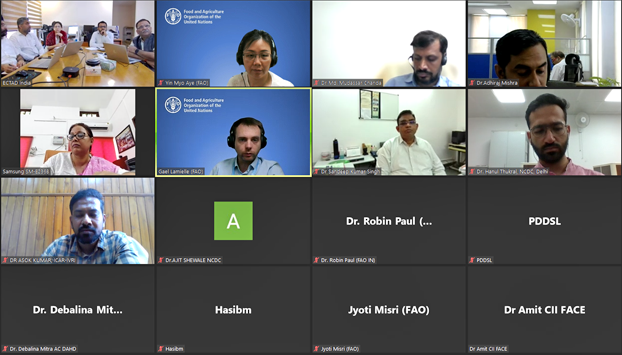 ©FAO/Yin Myo Aye | ASIA AND THE PACIFIC AND INDIA First meeting of the core planning team for animal disease prioritization On 6 June, FAO and the national core planning team met to prepare for animal disease prioritization in India. This workshop will utilize the One Health Zoonotic Disease Prioritization approach supported remotely by the United States Centers for Disease Control and Prevention. The national core planning team includes representatives from various and relevant ministries and partners The goals of the workshop are to prioritize animal diseases of greatest concern affecting terrestrial animals (including livestock, poultry and wildlife), and to develop next steps and action plans to address the priority animal diseases in collaboration with partners, thanks to USAID.
|
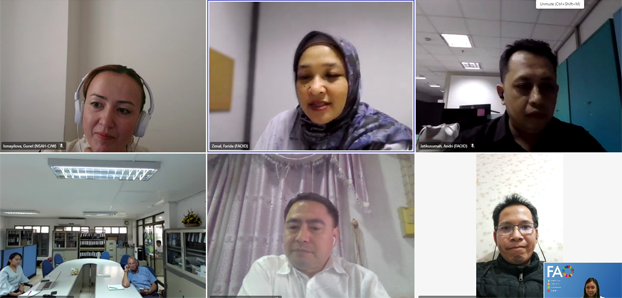 ©FAO/Yin Myo Aye | ASIA AND THE PACIFIC, INDONESIA AND LAO PEOPLE’S DEMOCRATIC REPUBLIC Introduction of the Multisectoral Coordination Mechanisms Operational Tool FAO introduced the Multisectoral Coordination Mechanisms Operational Tool (MCM OT) to our team in Indonesia and Lao People’s Democratic Republic on 6 June. MCM OT supports planning, communication, advocacy and implementation of joint zoonotic disease management and control through a One Health mechanism. It ensures consensus, coordinated action and sustained and transparent communication across all relevant sectors by developing a validated action plan based on 18 technical elements.
|
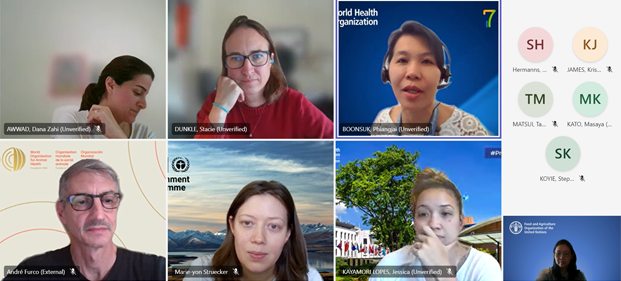 ©FAO/Yin Myo Aye | ASIA AND THE PACIFIC Discussion on piloting the Competencies for One Health Field Epidemiology framework by regional Quadripartite offices On 10 June, headquarters and the regional Quadripartite offices discussed the benefits of multisectoral collaboration for field epidemiology training and the piloting of the Competencies for One Health Field Epidemiology (COHFE) framework. This framework supports incorporating the One Health approach into field epidemiology training programmes. The COHFE framework outlines the knowledge, skills and competencies required for field epidemiologists in public health, animal health or environment sectors to implement the One Health approach. It consists of 14 domains with guidance for the frontline, intermediate and advanced training levels. |
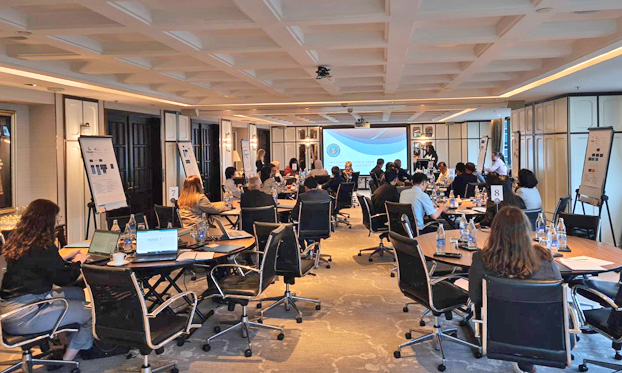 ©FAO/Gael Lamielle | ASIA AND THE PACIFIC Strengthening regional biological threat preparedness in a One Health context FAO attended a regional workshop on strengthening regional biological threat preparedness in a One Health context in Bangkok, organized by Watermark Risk Management and supported by DTRA. This workshop concluded a 5-year regional programme, starting in 2019, aimed at strengthening cross-border multisector One Health networks in Southeast Asia. National delegations from Cambodia, Indonesia, Lao People’s Democratic Republic, Malaysia, Thailand, the Philippines and Viet Nam participated. The workshop enhanced cross-sector and cross-border communication, information-sharing networks and risk communication techniques for zoonotic disease outbreaks. It also reviewed ongoing initiatives and best practices for effective coordination and information sharing to address emerging biological threats.
|
| Learn more about our work on One Health here. | |
